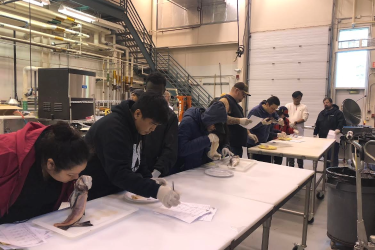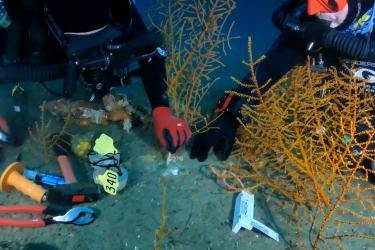NOAA’s Office of Law Enforcement is asking the public for any information about a sick dolphin that stranded on Quintana Beach, Texas. The bottlenose dolphin stranded alive on Sunday, April 10. After the stranding, multiple people interacted with the animal. A necropsy, or non-human autopsy, indicated that the dolphin died from drowning.
Video stills obtained during the event could help identify individuals who have direct information concerning this event. If anyone can identify the individuals depicted in the photographs, NOAA encourages you to contact NOAA’s Office of Law Enforcement Hotline at (800) 853-1964. Tips may be left anonymously.
NOAA's Office of Law Enforcement is offering a reward of up to $20,000 for information leading to one or all of the following:
- Successful identification
- Successful prosecution for the person(s) responsible
- An arrest, conviction, or civil penalty assessment
Please include your name and contact information when calling enforcement to be eligible for the reward.
This incident follows a recent case in Florida where a dolphin was intentionally harmed. Harassing, harming, killing or feeding wild dolphins is prohibited under the Marine Mammal Protection Act. Violations may be prosecuted civilly or criminally and are punishable by up to $100,000 in fines and up to 1 year in jail per violation.
Do’s and Don’ts for Stranded Marine Mammals
Do Not:
- Don't push the animal back out to sea. Stranded marine mammals may be sick or injured. Returning animals to sea delays examination and treatment and often results in the animal re-stranding in worse condition.
- If the animal returns to the water on its own, DON’T attempt to swim with it.
- If the animal is alive, DON’T cover or obstruct the blowhole. Try to keep sand and water away from the blowhole.
- DON’T collect any parts (tissues, teeth, bones, or gear, etc.) from dead animals. They are still covered by the Marine Mammal Protection Act.
Do:
- DO keep crowds away and noise levels down to avoid causing further stress to the animal.
- DO report all dead marine mammals, even if they are decomposed.
- DO keep pets away from the live or dead marine mammal.
- DO put human safety above animal safety. If conditions are dangerous, do not attempt to approach the animal.
- DO stay with the animal until rescuers arrive, but use caution. Marine mammals can be dangerous and/or carry disease. Keep a safe distance from the head and tail. Also, minimize contact with the animal (use gloves if necessary) and avoid inhaling the animal’s expired air.
- If the animal is alive, DO keep its skin moist and cool by splashing water over its body. Use wet towels to help keep the skin moist and prevent sunburn.

